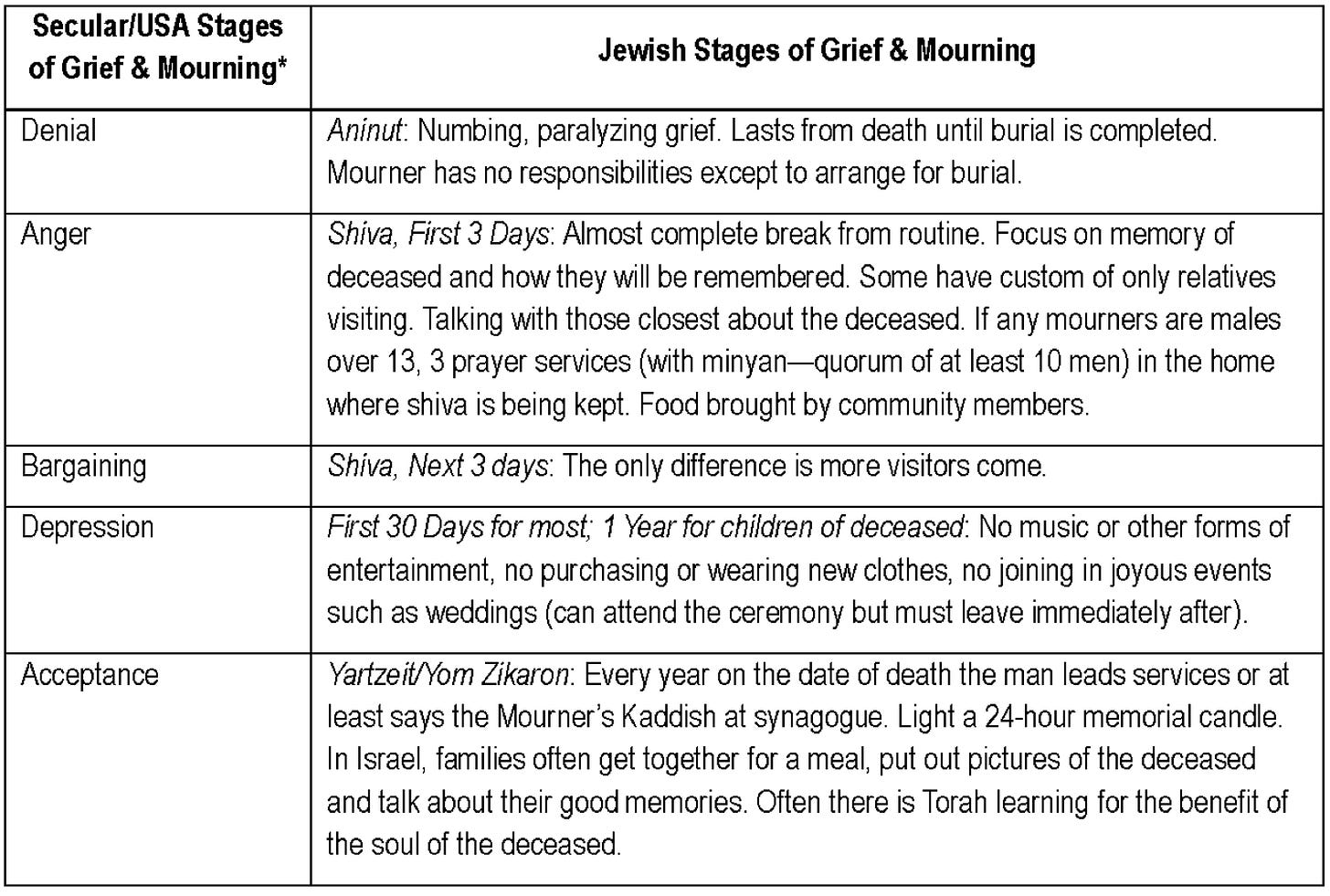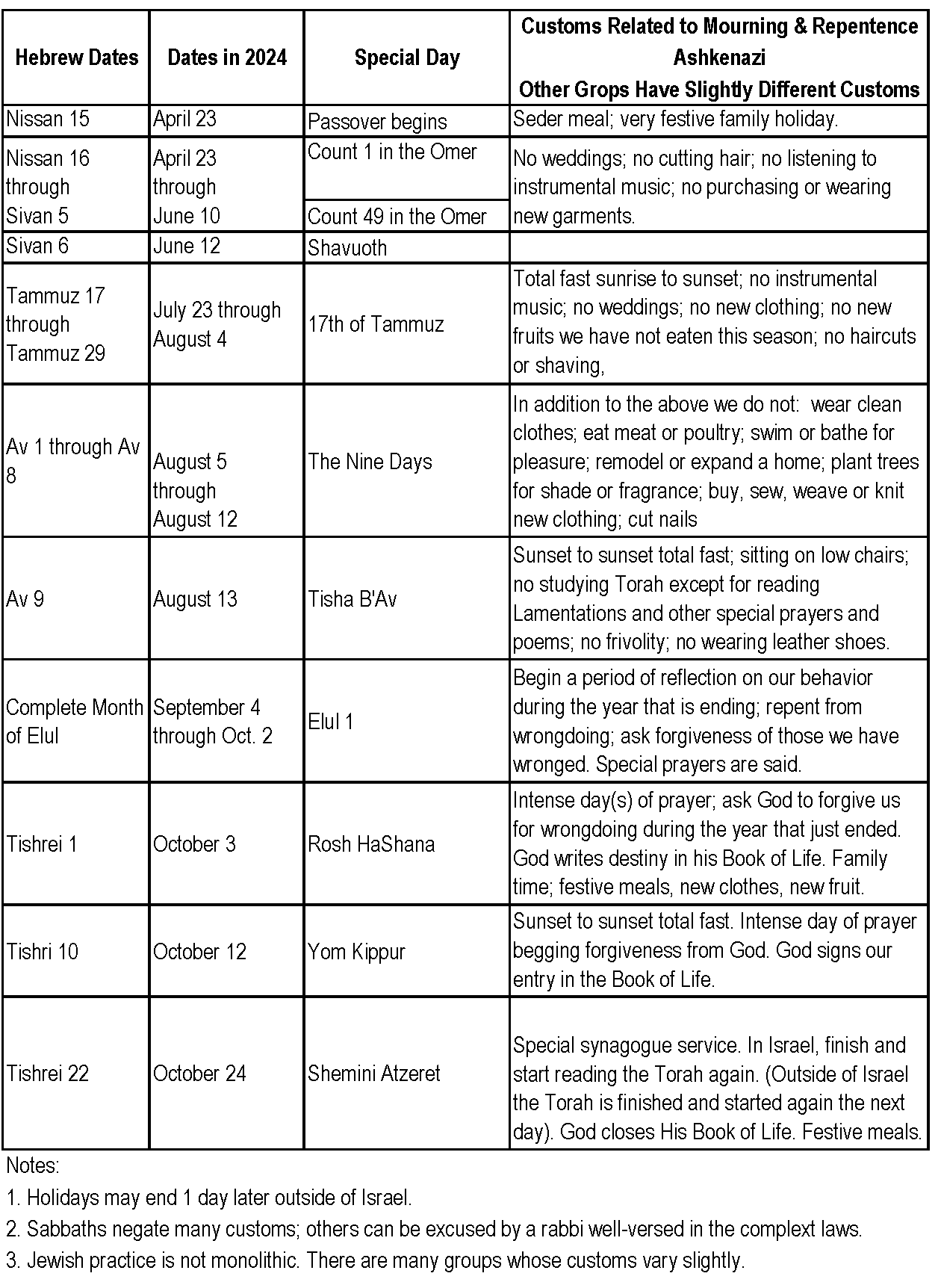Why Remember the Past?
Is focusing on the destruction of our Temple 2,000 years ago dysfunctional, or does it serve a purpose?
A woman I once worked with, a lapsed Catholic married to an equally secular Jewish man, told me that her husband left Judaism because it focused on the past instead of the future. She used Tisha B’Av as the example.
At the time I knew her, I had been religiously observant only a handful of years. I was still getting used to the different customs and special days that were ignored in the liberal Judaism I was raised with. I had not yet started to understand them.
What I did know was that on Tisha B’Av we commemorate the destruction of the Temple in Jerusalem in the year 70. This day marks the end of a period called the Three Weeks, which began on the 17th of Tammuz—the date on which the Romans breached the wall of Jerusalem.
The Three Weeks begin with a sun-up to sun-down fast and conclude on Tisha B’Av with a 24-hour fast. During this period we follow mourning customs, with our observance more and more stringent as the weeks progress until on Tisha B’Av itself, we observe full mourning, as though we had lost a parent. For example:
We do not wear leather shoes
We sit on low benches or stools (or on sofas with the seat cushion removed)
We do not bathe, engage in marital relations, or wear clean clothes
We do not listen to music, study Torah (except the laws of Tisha B’Av), or do anything else enjoyable
My coworker’s comment left me puzzling two questions.
Why did we Jews focus on the past—was it, as she had said, because we were stuck on our ancient glory days instead of the present?
Why do we commemorate Tisha B’Av with mourning for a Temple we never saw, a building that was destroyed so many, many generations ago? Why should it still matter to us?
Jewish Mourning
As I explained in the “For Parents, Teachers & Others” section of an earlier post, Jewish mourning customs are very different from those most often practiced in the USA. Jewish mourning has a formal, specific structure. Both the mourners and those giving condolences and support have specific responsibilities and strictures.
*This is the most common order as defined by Dr. Elisabeth Kubler-Ross, but later researchers found that for many people, the order is different.
As my table shows, the traditional Jewish customs fit roughly into the emotional stages Kubler-Ross identified. My first impression was that “anger” did not fit. Then I realized that most people are only comfortable expressing anger at the deceased to those with whom they feel most comfortable: someone who knew the deceased well and understands their faults; and who knows the mourner well, and knows that this anger is not a normal part of their character. That is, close relatives.
But what does this—these stages of mourning—have to do with the Three Weeks and Tisha B’Av? And why does this have any meaning for Jews today?
The destruction of the Temple in Jerusalem and the removal of the Jews as slaves meant the end of Jewish life as it had been. The Temple service and the three pilgrimage holidays, when most Jews went to Jerusalem to participate in the Temple activities, had been important spiritually. They were ways of asking and obtaining forgiveness for sins as well as a way of being connected to God. Losing these was a huge loss for all the Jews.
The slaves, some 97,000[i] forcibly removed from their homeland, were in bondage in a land with a different language, religion, and culture. There were already well-established Jewish communities in Italy, including Rome, but how accessible these were to the slaves I do not know.
To a demoralized people who had the custom of memorializing their dead, it is natural that the 9th of Av would have been important. Today Jews find meaning in Yom HaShoah, Holocaust Memorial Day, and many use it as a yartzeit for those family members lost in the Shoah whose death dates are unknown. Certainly Tisha B’Av filled the same function for both the slaves and the remnant in the land.
Tisha B’Av Today
The strictures of the Three Weeks move in the opposite direction from mourning. In mourning, the limitations are greatest at the time of death and burial, gradually loosening. In the Three Weeks-Tisha B’Av continuum, we go from the least to the most severe limitations.
As we move through the Three Weeks, we are more and more aware of mourning, death, bereavement. Not turning on music is easy for a few days; but for those who love music and listen daily, by the end of a week or two there is a growing hole where it used to be. This is for many people a true loss as they are going through it. Foregoing entertainment also becomes more and more difficult as the days pass. These losses help us focus on the loss of the Temple, what it meant to the Jewish people, and how it impacts us today.
Today, with millions of Muslims and “useful idiots” proclaiming that we have no historical connection to the Land of Israel, the loss of the Temple is particularly acute. Two Muslim temples stand on our Temple Mount, and while Muslims have always been permitted to pray there, we Jews were not. Even moving our lips in silent prayer on top of the Temple Mount was forbidden to Jews. This is changing now, but for how long is unknown.[ii]
The Three Weeks gives us ample time to contemplate the historic explanation for the destruction of the Temple: Disunity among the Jews, with senseless hatred between us a huge problem.
“Two Jews, three opinions” is generally accepted, in the Jewish world, as a truth.
Then there is the ancient joke of the Jew stranded for years on a desert island. Finally he is rescued. Before he leaves the island, he takes his rescuer on a tour.
“This is where I made tools…This is where I slept…This is my kitchen…This is my synagogue…This is the other synagogue.”
“Two synagogues?” asks the rescuer.
“Yes. That is where I prayed. This is the one I won’t set foot in.”
The underlying problem causing Tisha B’Av still exists. And the spiritual calendar from Passover through Shemini Atzeret is designed to bring this issue to the forefront of our consciousness.
The Three Weeks begin roughly six weeks after the end of the Omer. This is a 49-day period of light mourning between Passover and Shavuoth. Mourning during the Omer is attributed to the deaths of the 24,000 students of Rabbi Akiva, who died of a plague because they did not show respect for each other.
Lack of respect can easily grow into senseless hatred.
As an example, take a sentence from a document I was considering for an editing job (I turned down the work). Speaking of leftist demonstrations, reportedly financed in part by George Soros’ Open Society Foundations and other left-leaning nonprofits, the author wrote:
Nationwide protests comprising hundreds of thousands of citizens took place every week for ten months. The government refused to compromise or budge in any way, thus confirming [emphasis HBG] fears that Israel would become a dictatorship.[iii],[iv]
The use of the word “confirming” in this context is in my opinion an example of senseless hatred. Had Netanyahu wanted to be dictator, he would have become one long ago.
This hatred, in my opinion, stems at least partly from a lack of respect.
A Sad Bit of Jewish History
The left in Israel has its roots in the Communist-Socialist philosophy of Jews from the Russian Empire who came to Israel in the late 1800s. When they arrived, they found Jewish communities already in the land. The “Old Yishuv,” as it was called—the existing Jewish population—included European and Yemenite Jews who had immigrated to what was then called Palestine hundreds of years earlier as well as some who had been expelled from Spain and Portugal due to their Inquisitions, other returnees, and communities who could trace their origins to the days before the destruction of the Second Temple.
The Zionist pioneers who wanted to build a secular, socialist Jewish utopia tended to treat people from the Old Yishuv, who were mostly devoutly religious with no secular learning, as though they were stupid, incompetent, and a hindrance to the fruition of their vision. Their attitude continued after the establishment of the state of Israel, when hundreds of thousands of Jews were forced from their homes in North Africa and the Middle East and settled in Israel.
This lack of respect bred arrogance that resulted in ignoring any information or experiences that might have helped them be accepted by existing communities including Muslim and Christian Arabs as well as non-Arab communities such as the Armenians.[v]
Both arrogance (the power group) and resentment (the weaker group) lead to negative feelings that make listening to the other very difficult if not impossible. These attitudes have now morphed into a sustained hatred of the left for the right and vice-versa.[vi]
Disunity Today
Every Israeli I know believes that the disunity shown by the demonstrations mentioned in the quote above were a major factor in Hamas deciding to launch its offensive. This war, which began 10 months ago, is a result of our disunity.
This is just exactly like the disunity that fractured the Jewish community nearly 2000 years ago, when some Jews favored assimilation to the Roman culture while others favored maintaining traditional Judaism. Even the underlying issues are basically the same: assimilation to a one-world order versus living and teaching the Jewish way of life.
An Old Ruin, or the Foundation of the New?
Jewish time is more like a Slinky toy than the yardstick used in American schools to demonstrate the passage of time, where the past is behind the present. We believe that time is cyclic: the years pile upon each other, one after the other; but each day reverberates through the generations.
The lessons keeping the memory of our Temple alive, and the memory of its destruction, have, I believe, been important factors in drawing the Jewish people together over the years.
For at least these three weeks a year for nearly 2000 years we have contemplated disunity and unity. This interior work prepares us for Elul, the month beginning three weeks after Tisha B’Av. Elul is dedicated to evaluating our behavior and mending our bad habits and broken relationships. When Elul ends, Tishre begins with Rosh HaShana, when God evaluates us and writes our future in His book. Ten days later, on Yom Kippur, He signs the book, and about two weeks after that, on Shemini Atzeret at the end of Sukkot, He seals the book.
What will the coming year hold? The war is not over yet. Like ancient Israel in the time of Rome, we are unloved as a nation; we get little formal support from outside, although graffiti in Iran and support from individuals around the world are encouraging.
Baseless hatred, which caused Jerusalem to fall 2000 years ago, comes both from within and without. It is still a problem that we need to overcome.
At the same time, there is a belief among many Jews (and non-Jews) that we are entering the End of Days. A rabbi/historian friend tells me that he has been following current events closely and finds that they match ancient prophecies that foretell the coming of Mashiach and the beginning of the era of true world-wide peace. This is what many Christians call “the second Coming.”
In Israel, some groups of devout Jews are teaching and learning the Temple service. Others work at breeding red cows in the hopes of being able to provide a red heifer when, not if, a new Temple is built.
Now, if I could answer that old co-worker, I would tell her that remembering the past, even the ancient past, helps prepare us for the future. George Santayana, American philosopher, wrote,[vii] "Those who cannot remember the past are condemned to repeat it." The lessons of Tisha B’Av, difficult as they are, have shaped the Jewish people into the resilient people we are, able to stand up for what we believe is right: a moral world where we are united in brotherhood and Torah; a world where we can share the lessons God gave us with others; a world in which all people can live together in peace and prosperity.
[i] I found this number in several non-academic writings but could not find any number in an authoritative work.
[ii] https://www.jewishpress.com/news/israel/temple-mount-har-habayit/ben-gvir-alienates-allies-by-allowing-jewish-prayer-on-temple-mount/2024/07/24/
[iii] I am deliberately not attributing this quote to the author in order to protect her anonymity..
[iv] Today’s leftists tend to be highly educated but limited in common sense. They are often academics who have little or no experience with the private sector (businesses). Because they often attended private schools and/or elite universities, they believe they are smarter than other people. They dwell in the land of ideas, which anyone responsible for making payroll knows is very different from the practical world. Note the word “confirming,” which means validating, verifying, and affirming. Anyone with practical sense rather than academic sense knows that in the years Netanyahu has been prime minister, if he intended to become a dictator he would have already done so. The fact that the country is divided, and that thousands of people opposed to the leftist plan demonstrated without being paid, should have alerted the author to the fact that the country was divided, which in no way affirmed that Israel would be come a dictatorship. There is absolutely no evidence that changing the judicial system would create a dictatorship. In fact, the judicial system is now above the reach of both the prime minister and the Knesset. It appoints its own members from its own cadre, which makes it the dictatorship, as those on the right are well aware, and which they want to change since Israel is supposed to have a democratically-elected leadership, not one that is at the mercy of a closed group of leftists.
[v] Years ago I read an interesting article that said that under Ottoman rule the Muslims and Jews lived side by side amicably. Hostility to Jews developed when the socialist groups came with immodest dress of the women, lax standards of marriage among the Zionists, and no attempts made by the Jews to adapt at all to their neighborhoods, even such as women making no effort to dress modestly when they shopped at Arab markets—much like the way the Muslim immigrants to Europe are imposing their behaviors on the Europeans. This created an atmosphere that was ripe for the Nazi philosophy, which was adopted whole-heartedly by the Mufti of Jerusalem and others.
[vi] I was raised by staunch leftists and considered myself a liberal until I was in my 40’s, when I found myself often being verbally attacked by other Democrats for being proud of being Jewish and loving Israel. I have never had a similar negative experience from people on the right. Man-in-the-street YouTube videos have shown leftists entering right-wing demonstrations and being shocked when they are welcomed and treated well; the same videos have shown right-wingers who have been verbally attacked. Wearing a red cap (color alone, even without MAGA printed on) has been enough to trigger physical threats. [MAGA stands for “Make America great again,” President Trump’s motto.] Despite the rhetoric, leftists tend to be the haters, rather than those on the right.
[vii] Santayana, G., The Life of Reason: Reason in Common Sense, as explained at https://www.enotes.com/topics/history-general/questions/who-said-those-who-forget-history-condemned-repeat-76851, accessed August 1, 2024.





